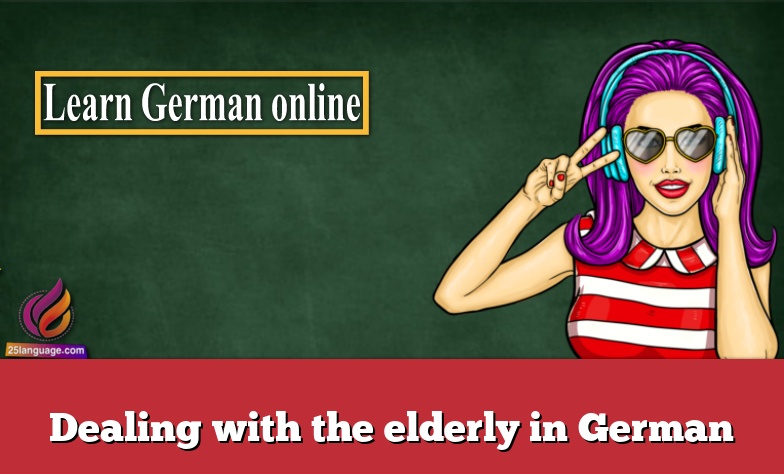Dealing with the elderly in German

Dealing with the elderly in German.At various stages in life, an individual’s role in society shifts, as do their needs and aspirations. Arguably, old age is one of the most complex and sensitive of these stages. In this phase, the individual becomes a focus of heightened attention—be it medical, social, or psychological.
Phrases about dealing with the elderly in German
| German Phrase | English Translation | Context or Usage |
|---|---|---|
| Wie geht es Ihnen heute? | How are you today? | General check-in or greeting |
| Brauchen Sie Hilfe beim Einkaufen? | Do you need help with shopping? | Offering assistance with errands |
| Kann ich Ihnen einen Stuhl bringen? | May I bring you a chair? | Offering comfort or assistance |
| Möchten Sie über alte Zeiten sprechen? | Would you like to talk about old times? | Initiating a conversation about the past |
| Darf ich Ihnen bei der Medikation helfen? | May I help you with your medication? | Offering assistance with medication |
| Haben Sie Schmerzen? | Are you in pain? | Health-related check-in |
| Ich hole Ihnen eine Decke. | I’ll get you a blanket. | Offering comfort |
| Soll ich den Arzt rufen? | Should I call the doctor? | In case of a health concern |
Sentenses about dealing with the elderly in German
| German Sentence | English Translation | Context or Usage |
|---|---|---|
| Wie können wir Ihre Lebensqualität verbessern? | How can we improve your quality of life? | Discussing overall well-being |
| Ich werde Ihnen beim Aufstehen helfen. | I will help you get up. | Assisting with mobility |
| Sagen Sie mir, wenn Sie Schmerzen haben. | Tell me if you are in pain. | Monitoring comfort and health |
| Lassen Sie uns Ihre Medikamente überprüfen. | Let’s review your medications. | Discussing medication and health |
| Wir sollten einen Termin beim Arzt vereinbaren. | We should make an appointment with the doctor. | Planning a healthcare visit |
| Darf ich Ihnen etwas zu Essen oder zu Trinken anbieten? | May I offer you something to eat or drink? | Providing nourishment |
| Bitte bleiben Sie sitzen, ich hole Ihre Brille. | Please stay seated, I’ll get your glasses. | Assisting with personal items |
Conversation with elderly in German
| German Dialogue | English Translation | Context or Usage |
|---|---|---|
| Guten Tag, Frau Müller. Wie geht es Ihnen? | Good day, Mrs. Müller. How are you? | Initial greeting and well-being check |
| Mir geht es gut, danke. Und Ihnen? | I’m doing well, thank you. And you? | Responding to the greeting |
| Auch gut, danke. Brauchen Sie heute Hilfe? | I’m also well, thank you. Do you need help today? | Offering assistance |
| Ja, könnten Sie mir bitte beim Aufstehen helfen? | Yes, could you please help me get up? | Requesting specific help |
| Natürlich, ich helfe Ihnen gerne. | Of course, I’m happy to help. | Confirming willingness to help |
| Vielen Dank, das ist sehr freundlich. | Thank you, that’s very kind. | Expressing gratitude |
| Gern geschehen. Möchten Sie spazieren gehen? | You’re welcome. Would you like to go for a walk? | Suggesting an activity |
| Das wäre schön, aber ich fühle mich heute ein bisschen schwach. | That would be nice, but I feel a bit weak today. | Declining based on health condition |
| Dann vielleicht ein anderes Mal. Soll ich Ihnen einen Tee machen? | Then maybe another time. Shall I make you some tea? | Offering another form of comfort |
| Ja, das wäre schön. Danke. | Yes, that would be nice. Thank you. | Accepting the offer |
| Kein Problem, ich mache das gleich. | No problem, I’ll do it right away. | Confirming the task |
| Sie sind sehr hilfreich, danke. | You are very helpful, thank you. | Expressing gratitude for the help |
In conclusion, it’s crucial to always remember the value and wisdom that the elderly can bring to our communities. However, we can’t overlook the significant challenges they face, whether they are health-related, economic,or social.




























